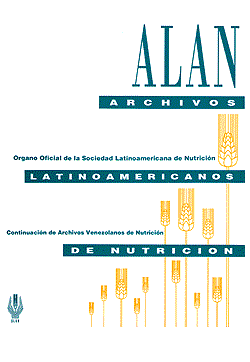Prevalence and magnitude of body weight and image dissatisfaction among women in dietetics majors
Palabras clave:
Body Weigh, Body Image, Dissatisfaction, Body Fat, Index of Muscularity, Dietitians, Peso Corporal, Imagen corporal, Insatisfacción, Grasa Corporal, Índice de Musculación, DietistaResumen
Some authors have suggested that body weight dissatisfaction may be high in students majoring in dietetics. Therefore, this study was conducted to examine the extent of body weight and image dissatisfaction in a sample of women in dietetics major. Additionally, predictors of magnitude of body weight dissatisfaction were analyzed. Participants were 62 volunteers with normalweight whose mean age was 21.87±1.89 years old (nonrandom sample). The assessment instruments included anthropometric measurements, a somatomorphic matrix test and an eating disorders inventory (EDI-2). Data were analyzed using SPSS vs. 15.0. A larger proportion of students chose an ideal body weight lower than actual weight (67.7%) and body image with less body fat and more muscle mass than actual values (56.4%). The magnitude of body weight dissatisfaction was associated with muscle mass and body fat dissatisfaction, and with the subscale of EDI-2 “body dissatisfaction”. So, from a public health standpoint, we consider important to continue working in this line of research with the aim of better understanding the extent of body weight dissatisfaction in women dietitians, and how this dissatisfaction could interfere with their professional practice.
Algunos autores han sugerido que los estudiantes de Dietética pueden presentar una elevada insatisfacción con el peso corporal. Por este motivo, se llevó a cabo el presente trabajo con el objetivo de analizar la insatisfacción con el peso y la imagen corporal en una muestra de mujeres estudiantes de Dietética. Además, se analizaron predictores de la magnitud de la insatisfacción con el peso corporal. Las participantes fueron 62 voluntarias con normopeso que tenían una media de edad de 21,87±1,89 años (muestra no aleatoria). La evaluación incluyó medidas antropométricas, el test somatomórfico matrix y el eating disorders inventory (EDI-2). Los resultados se analizaron con el programa estadístico SPSS vs. 15.0. Un elevado porcentaje de estudiantes eligieron un peso ideal menor que su peso actual (67,7%) e imágenes corporales con menos grasa corporal y más masa muscular que la que tienen actualmente (56,4%). La magnitud de la insatisfacción con el peso corporal se asoció con la insatisfacción con la grasa corporal y la masa muscular, y con la subescala “insatisfacción corporal” del EDI-2. Por lo que, desde el punto de vista de salud pública, consideramos de interés seguir trabajando en esta línea de investigación con el objetivo de comprender mejor el grado de insatisfacción con el peso corporal en mujeres dietistas, y cómo esa insatisfacción podría afectar a su práctica profesional.
Descargas
Descargas
Cómo citar
Número
Sección
Licencia
Usted es libre de:
Compartir — copiar y redistribuir el material en cualquier medio o formato
Adaptar — remezclar, transformar y construir a partir del material
La licenciante no puede revocar estas libertades en tanto usted siga los términos de la licencia
Bajo los siguientes términos:
Atribución — Usted debe dar crédito de manera adecuada, brindar un enlace a la licencia, e indicar si se han realizado cambios. Puede hacerlo en cualquier forma razonable, pero no de forma tal que sugiera que usted o su uso tienen el apoyo de la licenciante.
NoComercial — Usted no puede hacer uso del material con propósitos comerciales.
No hay restricciones adicionales — No puede aplicar términos legales ni medidas tecnológicas que restrinjan legalmente a otras a hacer cualquier uso permitido por la licencia.




